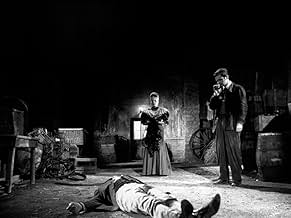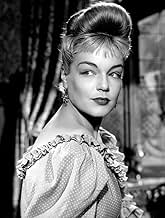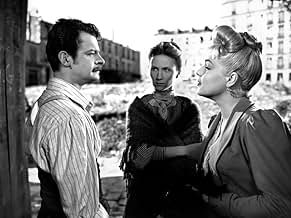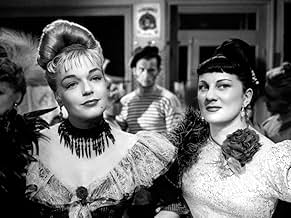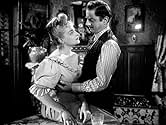ÉVALUATION IMDb
7,6/10
6,4 k
MA NOTE
Dans la France de la Belle Époque, trois voyous et un ancien escroc devenu charpentier tombent amoureux de la même femme, une sublime créature à la chevelure dorée.Dans la France de la Belle Époque, trois voyous et un ancien escroc devenu charpentier tombent amoureux de la même femme, une sublime créature à la chevelure dorée.Dans la France de la Belle Époque, trois voyous et un ancien escroc devenu charpentier tombent amoureux de la même femme, une sublime créature à la chevelure dorée.
- A remporté le prix 1 BAFTA Award
- 2 victoires et 2 nominations au total
Solange Certain
- L'amie de Paulo
- (as Solange Certin)
Émile Genevois
- Billy - membre de la bande
- (as Emile Genevois)
Histoire
Le saviez-vous
- AnecdotesLiterary critics at the time were outraged by the fact that Jacques Becker chose to emphasize atmospherics at the expense of psychology. Nevertheless, Becker's approach had a profound effect on the young film-makers that would later go on to form the French New Wave, thereby changing French cinema forever.
- Citations
[English subtitled version]
Old Woman Joinville Bar Patron: Charming! We can't go anywhere without meeting tarts.
- ConnexionsEdited into Apostrophes: Les plaisirs populaires (1989)
- Bandes originalesSobre las Olas
(uncredited)
Music by Juventino Rosas
[The music to which Marie reluctantly dances with Roland at Joinville]
Commentaire en vedette
After being released from prison where he served five years for an undisclosed crime, Georges Manda (Serge Reggiani), a soft-looking, taciturn man with a handlebar moustache, becomes a hard working carpenter, determined to go straight. When Raymond (Raymond Bussieres), a fellow gang member with whom he served time in prison, introduces him to Marie (Simone Signoret) at a dance, however, the solid foundation he was trying to build begins to come unglued. Signoret, one of the classiest and most elegant actresses, is strikingly irresistible as the moll of a suave gang leader in Jacques Becker's 1952 masterpiece Casque D'or. Considered a failure when it first opened but, after receiving critical acclaim in New York, the film developed a wider audience in France and has now become a classic, newly restored on a Criterion DVD.
Set in Paris in the 1890s and based on actual police accounts, Casque D'or is not an arid period piece or costume drama, but a rich, vibrant, and lovingly evocative work that successfully recreates the ambiance of Paris at the turn of the century. Unlike Melville's Le Samourai which was filmed in near darkness to capture the sullen milieu of the underworld, Becker bathes his film in a dazzling poetic light that belies the darkness of its theme and some scenes have been compared to an impressionist painting. Marie is being "kept" by Roland (William Sabatier), a volatile and jealous dandy and is also sought after by the crime boss Felix Leca (Claude Dauphin). Manda and Marie fall in love but soon Manda runs afoul of the law after killing the jealous Roland in a fight. Leca seizes on this opportunity to remove Manda from the picture by framing his closest friend but doesn't count on Manda's dedication to doing what is right.
Despite being about the criminal element, there is little violence in Casque D'or and it is more of an moody romance than a crime drama, perhaps accounting for its initial failure at the box office. The most brilliantly realized sequence takes place at a countryside retreat where Manda and Marie go for a few hours of happiness together before the inevitable denouement. Casque D'or is a film about friendship, loyalty, and, most of all, about passion and its consequences. When Marie hears wedding bells and drags Manda into a church, all he can say is "not now", but his expression suggests that he knows that their love will be a dream that fades into dawn.
Set in Paris in the 1890s and based on actual police accounts, Casque D'or is not an arid period piece or costume drama, but a rich, vibrant, and lovingly evocative work that successfully recreates the ambiance of Paris at the turn of the century. Unlike Melville's Le Samourai which was filmed in near darkness to capture the sullen milieu of the underworld, Becker bathes his film in a dazzling poetic light that belies the darkness of its theme and some scenes have been compared to an impressionist painting. Marie is being "kept" by Roland (William Sabatier), a volatile and jealous dandy and is also sought after by the crime boss Felix Leca (Claude Dauphin). Manda and Marie fall in love but soon Manda runs afoul of the law after killing the jealous Roland in a fight. Leca seizes on this opportunity to remove Manda from the picture by framing his closest friend but doesn't count on Manda's dedication to doing what is right.
Despite being about the criminal element, there is little violence in Casque D'or and it is more of an moody romance than a crime drama, perhaps accounting for its initial failure at the box office. The most brilliantly realized sequence takes place at a countryside retreat where Manda and Marie go for a few hours of happiness together before the inevitable denouement. Casque D'or is a film about friendship, loyalty, and, most of all, about passion and its consequences. When Marie hears wedding bells and drags Manda into a church, all he can say is "not now", but his expression suggests that he knows that their love will be a dream that fades into dawn.
- howard.schumann
- 2 avr. 2006
- Lien permanent
Meilleurs choix
Connectez-vous pour évaluer et surveiller les recommandations personnalisées
- How long is Casque d'Or?Propulsé par Alexa
Détails
Box-office
- Brut – à l'échelle mondiale
- 1 413 $ US
- Durée1 heure 39 minutes
- Couleur
- Rapport de forme
- 1.37 : 1
Contribuer à cette page
Suggérer une modification ou ajouter du contenu manquant

Lacune principale
By what name was Casque d'or (1952) officially released in India in English?
Répondre
